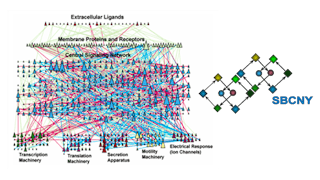Chemical biology is a burgeoning field that has rapidly risen to prominence. This surge of interest has been fuelled by chemical biology’s applicability to understanding critical processes in live cells or model organisms in real time. This success has arisen because chemical biology straddles a nexus between chemistry, biology, and physics. Thus, chemical biology can harness rapid chemistry to observe or perturb biological processes, that are in turn reported using physical assays, all in an otherwise unperturbed living entity.



(162 reviews)
Recommended experience
What you'll learn
Foundational comprehension of chemical biology
Interfacial science problem solving and method design
Understanding of applied, translational concepts in life sciences
Skills you'll gain
Details to know

Add to your LinkedIn profile
25 assignments
See how employees at top companies are mastering in-demand skills

There are 6 modules in this course
A very warm welcome to you, our new recruits! We'll start you off by acquainting you with the answers to big questions like why study chemical biology and what makes it special. We'll then show some highlights of the course that you are about to take. Finally, we want you to understand some fundamentals, so we are going to start off with some core concepts framed from the perspective of chemical biology.
What's included
8 videos8 readings4 assignments
A picture used to paint a thousand words. But with the advent of multiple color imaging, microscopy can open a lens with which to view life that few other techniques are capable of. We are thus going to take you on a colorful tour that will show you specific fluorophores, explain why different fluorophores have different colors, and how to rationalize why a molecule is fluorescent. Then we will use these fluorophores in cells, to visualize important cellular processes.
What's included
5 videos5 readings3 assignments
Here we will discuss how different fluorescent techniques have found fantastically useful applications to understand specific biological regulation processes in vitro and in live cells. We will focus on chromatin regulation and regulation of membrane tension as these are two systems which, without such techniques, we would not have the level of understanding we have today.
What's included
12 videos5 readings6 assignments
The classical view of biological science is the laboratory worker working hard to understand a specific protein of interest. But through chemical biology, we have been able to employ proteins to do some of this important work for us. In this module you will learn how to deploy modified protein domains to perform custom-designed functions using light-based techniques as a readout.
What's included
11 videos3 readings4 assignments2 app items
In recent years numerous chemical biology processes have harnessed light-induced chemistry to control biology in terms of turning on or off inhibition, and exerting remote control of localization or chemical reactivity, amongst numerous other examples not covered here. We shed some light on these processes and exemplify the full spectrum of procedures possible using such approaches.
What's included
9 videos2 readings4 assignments2 app items
We've learned how complex biology is, and how resourceful chemical biologist have started to peer into this complex landscape using custom-designed probes. But given the huge complexity of biology, we often have to start from ground zero, screening for a specific molecule or identifying a target of an interesting molecule. Here we will discuss methods that are ideal for these purposes in cells and in vitro.
What's included
8 videos1 reading4 assignments
Instructors


Offered by
Explore more from Chemistry
 Status: Free Trial
Status: Free TrialLecturio
 Status: Free Trial
Status: Free TrialIcahn School of Medicine at Mount Sinai
 Status: Preview
Status: PreviewUniversity of North Texas
 Status: Free Trial
Status: Free TrialUniversity of Colorado Boulder
Why people choose Coursera for their career




Learner reviews
162 reviews
- 5 stars
75.92%
- 4 stars
13.58%
- 3 stars
7.40%
- 2 stars
1.23%
- 1 star
1.85%
Showing 3 of 162
Reviewed on Dec 12, 2021
Amazing instuctors! Fabulous course, albeit challenging. I'd recommend it for those with a solid backgroud on related fields: Biophysics, Biochemistry, Chemistry, Biology, Genetics, etc.
Reviewed on Aug 15, 2021
A comprehensive and challenging course. An excellent overview of many chem bio concepts and offers a deeper understanding of powerful tools to use in the lab.
Reviewed on Nov 15, 2020
Very challenging yet interesting topic. This is 21st century science towards revolutionizing Systems Biology and other science fields

Open new doors with Coursera Plus
Unlimited access to 10,000+ world-class courses, hands-on projects, and job-ready certificate programs - all included in your subscription
Advance your career with an online degree
Earn a degree from world-class universities - 100% online
Join over 3,400 global companies that choose Coursera for Business
Upskill your employees to excel in the digital economy
Frequently asked questions
To access the course materials, assignments and to earn a Certificate, you will need to purchase the Certificate experience when you enroll in a course. You can try a Free Trial instead, or apply for Financial Aid. The course may offer 'Full Course, No Certificate' instead. This option lets you see all course materials, submit required assessments, and get a final grade. This also means that you will not be able to purchase a Certificate experience.
When you purchase a Certificate you get access to all course materials, including graded assignments. Upon completing the course, your electronic Certificate will be added to your Accomplishments page - from there, you can print your Certificate or add it to your LinkedIn profile.
Yes. In select learning programs, you can apply for financial aid or a scholarship if you can’t afford the enrollment fee. If fin aid or scholarship is available for your learning program selection, you’ll find a link to apply on the description page.
More questions
Financial aid available,

